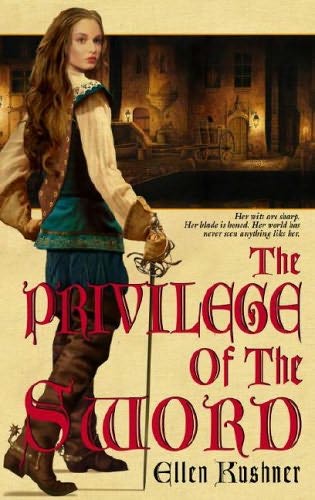The Privilege of the Sword came out in 2006, but in terms of how many times I’ve read it, it’s almost equal with Swordspoint. I’ll happily admit that it isn’t as original or as startling, but I’m just a pushover for stories about girls learning to be powerful against a background of different history.
Again, it’s a personal story with small stakes; again, there’s no magic; again, there are plenty of flashing blades and swirling cloaks. Fifteen-year-old Katherine comes to the City at the whim of her uncle, the Mad Duke Tremontaine, Alec from Swordpoint. He wants her to be trained as a swordsman, although this is not something properly brought up young ladies do at all. To begin with, she just wants pretty dresses and a Season, but then she discovers the realities of Society. The story takes six months, but in that time and on the page in front of us, Katherine grows up.
If I’d had this book when I was twelve, I’d have loved it with the burning power of supernovas, and even now I find it completely irresistable. It’s such terrific fun. It’s delightful. It has everything. There’s a melodramatic book (and a play adaptation) called The Swordsman Whose Name Was Not Death, which has enthusiastic fans. There are morning calls and drawn blades and splendid matches.
Beneath that there’s a deeper layer of reality. I don’t mean just that the city has (since Swordspoint) developed a middle class, that there are layers between the nobles and the lowlives of Riverside, though it’s definitely nice to see that it has. It’s the glimpse of the reality of what it would mean to make a splendid match, the deeper questioning of what honour is, and whether women have it. Then there’s the wonderful control of prose, the way Katherine slips from the formal language of her favourite novel to teenage informality, without ever slipping out of the world she belongs to. Great characters, beautiful prose, and swashbuckling combined with depth —I just uncritically adore this book.
I think you probably have to have read Swordspoint to appreciate it fully, though it wouldn’t have taken much to make it stand alone.
The Privilege of the Sword is set fifteen years after Swordspoint, and at first it seems to undo Swordspoint‘s ending. Swordspoint ends with Alec turning his back on his Tremontaine heritage and returning to Richard in Riverside. Fifteen years later, he’s the Duke Tremontaine and Richard is (at first) nowhere in sight. It ends with Alec, once again, turning his back on his heritage and going off with Richard. Kushner therefore tries to pull off the same ending twice, which works, but barely. Having Alec and Richard hold the place they do in The Privilege of the Sword unbalances the book’s emotional arc, which is all to do with Katherine learning the sword, the city, and herself. In the hands of a lesser writer, it would have entirely disintegrated. The first time I read it I wasn’t sure at all about the ending. It left me spluttering “What? What?” I’ve got used to it now, and have come to appreciate it. The Privilege of the Sword gains a great deal from being in the same world and having the depth of history, and the world itself has matured as a character, but when you have larger-than-life characters like Richard and Alec and they’re not the centre of the narrative, they’re almost bound to draw it off balance.
I do love it though.










